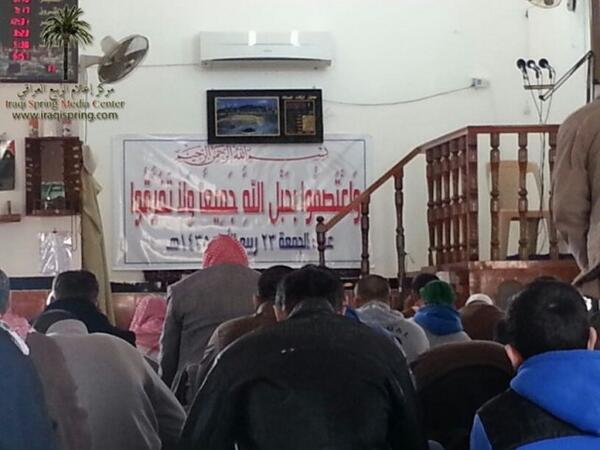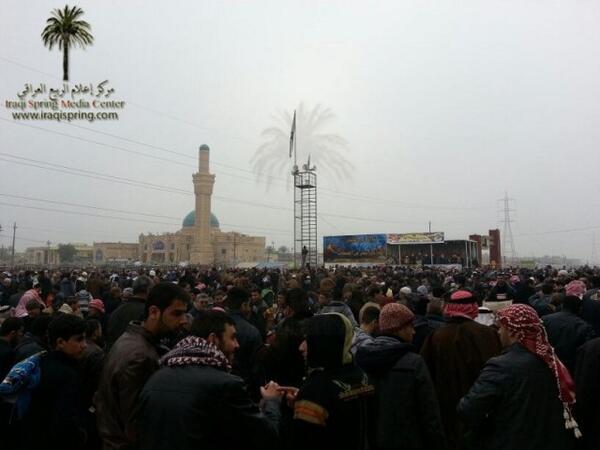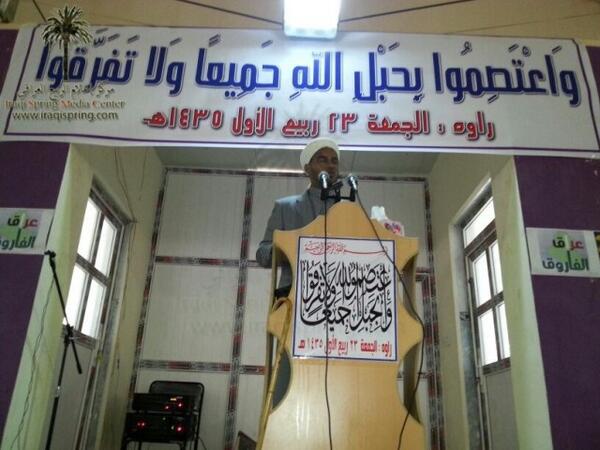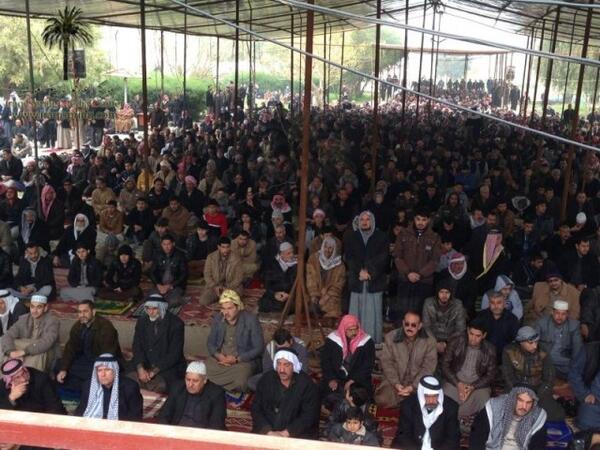At BRussells Tribunal, the Central Media Committee for Support of Iraq offers:
The peaceful nature of Iraqi protests that have been going on for one year has been shattered by Maliki's violence, It started with the Hweyjah massacre that killed 60 and wounded 300 protesters. Now, Maliki, backed by Iran and the US, escalated the violence against Iraqis by shelling cities, all over Iraq, with tanks, artillery, and aircraft. This vicious attack has prompted the valiant Arab tribes to step in, in order to protect the Iraqi people. It is the members of the Iraqi tribes, and ex-officers of the old patriotic army of Iraq who are defending the Iraqi people, not what Maliki pretends to be "terrorist groups like Qaeda and ISIS". When members of Maliki militias were captured by the resistance forces they were not harmed. Instead the Arab tribes gave them safe haven, food, and returned them to their homes and families. This is because this revolt is for the Iraqis themselves , it is against Iran and its puppet ruler in Iraq, Maliki.
Hence, it should be clear to see that this revolt represents all Iraqis. It is a patriotic revolt, not as the enemies of the Arab nation, such as the US, Britain, and Russia tried to portray it to be run by Islamic terrorists.
The terrorism that exists in Iraq today is made possible and orchestrated by the US and Iran. Sure proof to this has been the backing of Maliki at the US controlled UN and the Arab league that both miss-portray what is taking place in Iraq as Maliki fighting terrorism!
This revolt is not only that of the Anbar Arab tribes. It involves all Iraqi Arab tribes from the North to the South. It is a patriotic revolt to rid Iraq of the Iranian occupation to restore it to its people with security and justice for all.
Nouri's assaulting Anbar. And the US government is arming him to do so. Alsumaria quotes medical sources who explain that the residential neighborhoods in Falluja are being targeted and that many citizens are being killed and injured. It's so bad that even Abu Risha called today for the bombing of Falluja to stop. NINA reports that the military's shelling left three people injured in Ramadi in one incident, another incident of the Iraqi military shelling Ramadi with mortars left 3 civilians dead and five more injured, the military's shelling on Falluja left 3 civilians dead and eleven more injured and a second military shelling on Fallua left 3 civilians dead and six more injured.
Al Mada reports the Washington Institute for Near East Policy's Michael Knights says you can play out all the scenarios on Falluja but it won't matter because they're all bad. They're translating this USA Today column Knights wrote. Al Mada notes Speaker of Parliament Osama al-Nujaifi says the Sunnis of Anbar are trapped between the exchange of gun powder between the government forces and al Qaeda in Iraq.
That pretty much sums it up.
Ibrahim Ebeid offers this take at BRussells Tribunal:
Most of the American people are in the dark, there is no doubt that,
beside the media, the US political parties, Republicans and Democrats,
failed to tell the American people that the war and the invasion of Iraq
were not a mistake or Democracy: they were planned for from the time of
President Reagan and Margaret Thatcher, the Prime Minster of the United
Kingdom, under false pretence.
Both parties ignore the fact that about one-and-a-half million Iraqis
died since the invasion and they are still dying, more than half a
million children, under the age of 5 were perished in the first six
months of the deadly blockade unjustly imposed upon Iraq in 1991,
Secretary of State, Madeline Albright, said the price is worth it. Iraqi
children are worthless according to her and the United States
officials. The American politicians only recognize their own financial
losses and the American soldiers killed in action, and they ignore the
Iraqis killed and the complete destruction of Iraq and its institutions.
Since the occupation in 2003, the Iraqis are fighting to liberate Iraq,
and the US Media never tell us anything about the Baath and the
National Resistance, they only tell us distorted facts and lies. The
media are deceiving the majority of the American people and keeping
them blindfolded, in the dark, and ignorant.
Are the Media controlled by certain power of interest, such as the
Zionist Lobby and cannot have a mind of their own? Being a US citizen,
from Palestinian background, who is well aware of what is going on in
the "Middle East" I say yes , they are liars and controlled by the
Zionist Lobby, by AIPAC that "empowers pro-Israel activities across all
ages, religions and races to be politically engaged and build
relationships with members of Congress from both sides of the aisle to
promote the U.S.-Israel relationship" i.e.it controls America by
controlling the controlling the Congress.
The roots of the conflict? Stephen Zunes (National Catholic Reporter) explores that and notes:
At the end of December, Iraqi forces violently attacked a protest camp on the outskirts of Ramadi, killing 17 people. Human Rights Watch noted how the government's raid "seemed intended more to provoke violence than prevent it." Indeed, al-Qaida, despite lack of popular support even within the Sunni heartland, was able to take advantage of public anger at the crackdown to launch its unprecedented assaults on major urban centers in the Anbar province. The Obama administration responded by expediting additional military aid to the Baghdad regime.
This was the fifth major incident during 2013 in which security forces fired upon and killed peaceful protesters. A recent Amnesty International report noted how during the past year thousands of Iraqis were detained without credible charges, hundreds were sentenced to death or long prison terms after unfair trials, and "torture and other ill-treatment of detainees remained rife and were committed with impunity." Even parliamentarians are not immune from imprisonment on dubious charges, and extrajudicial killings have made Iraq the second most deadly country in the world for journalists.
The U.S.-backed Iraqi regime is dominated by sectarian Shia Muslim parties which have discriminated against the Sunni Muslim minority. The combination of government repression and armed insurgency resulted in the deaths of nearly 8,000 civilians last year alone.
If you include the dead from the shelling above and the Saturday death's we're about to go into, you get sixty deaths. And I'm sure I'm missing some. But you get 60 deaths and you get that on the day AP reports "at least 12" people killed in violence.
60? 12? Kind of a huge difference. Did someone want to knock early or did they just not want report the truth?
National Iraqi News Agency reports a Baghdad sticky bombing (Zayouna district) killed 1 person, a Balad roadside bombing claimed the lives of 2 police members and left three more injured, an al-Baath roadside bombing left 1 police officer and 1 police member killed and another police member injured, 1 suspect was shot dead by Salahuddin police, a bridge bombing near Tuz Khurmato left 2 people dead and five more injured, a Baghdad bombing (Alamiaah district) left four Iraqi soldiers injured, an attack on a Mosul military checkpoint left 2 Iraqi soldiers dead, 3 corpses were found in Hawi (young people who had been tortured to death), Anbar Operations Command noted they killed 20 fighters, a Baghdad (Saidiya area) left nine people injured, a Baghdad car bombing (Amiriya area) left 1 person dead and ten more injured, 2 Tuz Khurmato car bombings left 7 people dead and nineteen more injured, a family of 6 were killed in a Gizana Mulla Jawad Village attack, and Nouri's forces killed 2 suspects in Nineveh Province. All Iraq News adds an armed clash in Shurqat left 1 fighter dead and two police officers injured, 2 Balad bombing left 4 police members dead and two more injured, Alsumaria notes a Sharqat bombing targeting oil tankers left four people injured. Through Friday, Iraq Body Count adds up 865 violent deaths for the month thus far.
Again, how does AP get 12 out of 60?
JP Sottile (BRussells Tribunal) offers:
Back in the U.S., a reliably myopic and co-dependent media encourages denial among Americans. Since CNN “quietly” shuttered its Baghdad bureau last year, news from the steadily decaying country has been hard to come by, even as Iraq suffered a daily onslaught of bombings and attacks that made 2013 its deadliest year since 2007. Perhaps to its credit, CNN was the last TV news operation standing, but its departure completed a full retreat by the American news media that began, perhaps coincidentally, shortly after Obama won the White House.
After taking office, Obama dismissed the idea of accountability for the second Bush Administration or, by extension, for those within his own party who—like pre-emptive 2016 front-runner Hillary Clinton—aided and abetted its grand schemes in Congress. To wit, he quickly declared that he wanted his administration to “look forward, as opposed to looking backwards.”
“Don’t look back” is big hit with incoming administrations. It’s the careful karaoke and sanguine sidestep we get instead of truth and consequences. Bill Clinton sang the song as he entered the White House. His administration let a long-forgotten scandal called “Iraq-gate” just fade away and operatives in the first Bush Administration skated by without so much as a slapped wrist for the illegal arming of … wait for it … Saddam Hussein.
The song Sottile's referencing? The line is "don't you look back" and it's sung during the fade. It's Fleetwood Mac, who performed at the inauguration -- and that was one of the best performances in January 1993 -- another friend did not do well and that was partly because the sound crew sabotaged her because she was being a bitch to them in rehearsal (I'm sure everyone knows who I mean -- she didn't seem to grasp this would be a loud and boisterous crowd and some of the 'finer touches' she was fussing over would be lost in the festivities). The Fleetwood Mac song was "Don't Stop" ("thinking about tomorrow, Don't stop, it'll soon be here") and it's written by Christine McVie who, as Kat has noted, is rejoining the Mac (Mick Fleetwood, Stevie Nicks, John McVie and Lindsey Buckingham).
Yesterday's snapshot noted:
And on the topic of mosques, Kitabat reports that 'acting defense minister' Saadoun al-Dulaimi (he's not the Minister of Defense -- only Parliament can make someone that -- so he's something else, maybe Nouri's little sex toy?) declared that they (the Iraqi government) will bomb and target any home or mosque they think might contain a terrorist. Any home or mosque.
Dar Addustour reports on sex toy al-Dulaimi's threats against the mosques and the houses but offers that al-Dulaimi's attitude is: So what? He says if someone loses a home in a bombing -- the Iraqi military is bombing Falluja and Ramadi from overhead (usually in helicopters) -- it's not a big deal because the government will provide them a new one.
That's great, that makes up for the terror of having your home bombed, right? And memories are replaceable so who cares that the place you called home was destroyed by the government that's support you, right?
Nouri's pledging homes for all, FYI, throughout Iraq. It's not going to happen. This is the typical ahead of the election campaign promise from Nouri.
But on the topic of elections, Speaker of Parliament Osama al-Nujaifi was in DC this week meeting with various officials, doing interviews and speaking. Thursday's snapshot contained his speech at the Brookings Institution and he noted elections in his speech including in this section:
So the political components in Iraq were not able to build the Iraqi political system or to implement the Constitution and to reach a genuine partnership and a genuine reconciliation. They were not able to implement the laws as it should be and get rid of corruption and abuses and they did not respect all the Iraqi components as to represent them in a fair manner in the armed forces. According to the Constitution, they did not provide the provinces with enough funds. Also we did not adopt the law on hydrocarbons oil and gas which is very important to set a balanced relation between the provinces and the center for the production and exportation of oil.
So some parties are implementing the Constitution based on their own perspective and this is hindering the building of the state, the national cohesion and is leading to more division. And more and more people are being disappointed and do not trust the political process at this point as we have seen by the very low turnout in the last general elections [2013 provincial elections] and the ones before [2010 parliamentary elections]. We believe that Iraq is, at this point, at a crossroad. The key to situation is clear and we can find a solution. What we need though is a strong determination and the political will for everyone to agree on the Constitution and to forget the past, to move beyond the fears and to stop punishing the Iraqi people and move to reconciliation and prevent Iraq from sliding into even greater troubles.
Friday, Missy Ryan (Reuters) reported:
Usama al-Nujaifi, a Sunni, said in an interview during a visit to Washington that he feared attempts to discourage voting or "provoke the situation" in Sunni areas, or to sideline certain would-be candidates, were designed "to weaken Sunni representation in parliament."
He also warned that poor security could pose problems for the parliamentary polls, scheduled for April 30.
"If the security conditions worsen, the elections could be postponed (or) if they are held, they will take place under inappropriate conditions," he said.
There have been charges that Nouri launched the attack on Anbar in order to improve his low polling. There have been charges that he launched the attack to stop the parliamentary elections planned for April 30th.
Duriad Salman and Ammar al-Ani (Alsumaria) report al-Nujaifi gave two interviews today, the first to Sky News and the second to Alsumaria. Osama al-Nujaifi noted Nouri cannot continue to act unilaterally, that there are checks and balances in the system and he was concerned that Nouri thinks he's "singular" when it comes to decision making and that this could lead Nouri to attempt to postpone the upcoming election citing "poor security." Nouri did just that last year. And he wasn't supposed to. He ruled that Anbar and Nineveh could not vote. Under pressure from the US, specifically Secretary of State John Kerry, Nouri relented and, months later, allowed the two provinces to vote.
He never should have been allowed to postpone them. He doesn't have that power. The Independent High Electoral Commission is the only one that does and, as their name notes, they are supposed to be "independent."
If Nouri tries to keep provinces from voting, it will be worse than last time and it will be worse then cancelling the election all out. It will be corrupt.
He penalized the two provinces he was most disliked in last year. Those were provincial elections, citizens were voting on who to represent them in their provincial governments (think state governments if you're in the US and confused). These parliamentary elections are like federal elections. And if Utah wasn't allowed to vote to send people to the House and Senate, it wouldn't be a real election in the US.
In a later report, Duriad Salman and Ammar al-Ani report that the 'independent' commission is now saying that one or more provinces could be prevented from voting in the parliamentary elections.
No.
If that happens, they will not be real elections. Based on which slate gets the most votes, that slate is supposed to have someone in it named prime minister-designate. This is per the Iraqi Constitution. After being named prime minister-designate, the person then has 30 days to put together a Cabinet.
Not a partial Cabinet.
A full one.
This is in the Constitution and if you don't need a complete Cabinet, why the 30 day rule?
It's a complete Cabinet.
In 2010, the White House refused to honor the Iraqi voters or democracy or the Iraqi Constitution. Nouri's State of Law lost to Ayad Allawi's Iraqiya. But, like Al Gore in 2000, the true leader wasn't allowed to assume the post. The White House brokered a legal contract (The Erbil Agreement) to go around the voters. That contract caused all the problems, all the crises in Iraq today.
And now you're saying that some provinces might not be allowed to vote?
Like the ones Nouri can't carry?
This is a way to manipulate the vote and it should not be allowed to happen.
During the US Civil War, President Abraham Lincoln didn't stop the federal elections. People voted across the country. That was during the deadly Civil War, 1864. He was the sitting president (having been election in the 1860 elections). The country was ripped in two and violently fighting. Lincoln didn't say, "Stop! We must stop these elections!"
And a cheap thug like Nouri shouldn't be allowed to stop any area from voting either.
The following community sites -- plus Jody Watley, Cindy Sheehan, the Pacifica Evening News, Dissident Voice, Antiwar.com, C-SPAN, Jake Tapper and Tavis Smiley -- updated today and yesterday:
Plus Kat's "Sing Me the Songs That Say I Love You: A Concert for Kate McGarrigle" which isn't showing up on the link list.
We noted a video in the last entry and Susan e-mailed asking if there was anything newer?
I happen to love this.
That's Yuna. I love Nocturnal -- the album it appears on. I prefer the live version above though. (I preferred Amy Winehouse's AOL live sessions to Back To Black performances -- and I'm surprised they haven't tried to package those sessions.) I love that song, Yuna's "Falling." But I love "falling" songs period as friends will tell you. I think one of the best songs of the '00s was Alicia Keys' "Fallin'." It's deceptively simple in so many ways but the chords have complexity and the melody haunts -- most of all, it has multiple levels. Alicia has never gone static or fixed with the song. She can do it as regret, as passion, as a whispered plea, you name it. She's forever exploring that song and it's built sturdy enough to allow for those explorations. That was -- and remains -- the perfect marriage of her songwriting and singing talents. I've seen Alicia perform that song live five or six times and every time has been a revelation.
The e-mail address for this site is common_ills@yahoo.com.
iraq
all iraq news
national iraq news agency
alsumaria
brussells tribunal
central media committee for support of iraq
nafia abdul jabbar
brussells tribunal
ibrahim ebeid
national catholic reporter
stephen zunesh
jp sottile
the christian science monitor
dan murphy
iraq
iraq
iraq
iraq
iraq
iraq
iraq
iraq
iraq
iraq
iraq
iraq
iraq
iraq
iraq
iraq
iraq
iraq
iraq
iraq
iraq
iraq
iraq
iraq
iraq
iraq
iraq
iraq
iraq
iraq
iraq
iraq
iraq
iraq
iraq
iraq
iraq
iraq
iraq
iraq
iraq
iraq
iraq
iraq
iraq
iraq
iraq
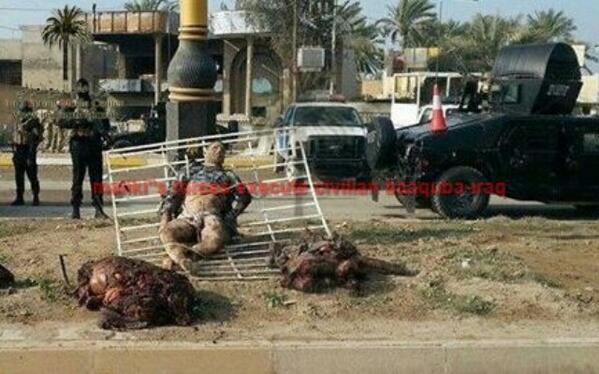
 اعلام الربيع العراقي
اعلام الربيع العراقي 